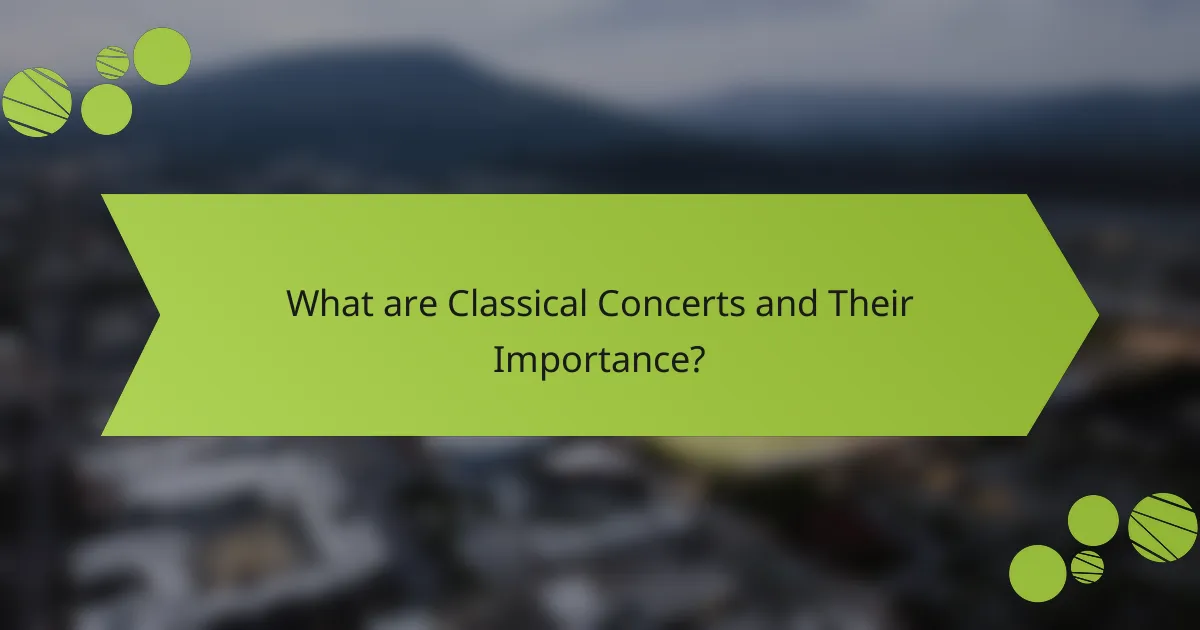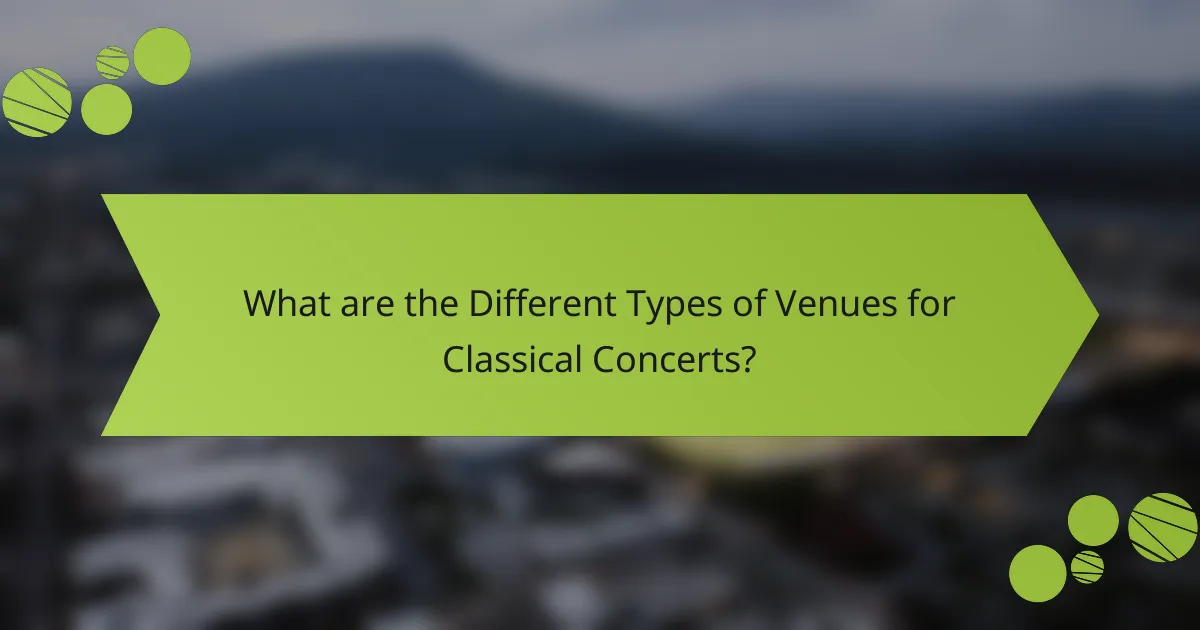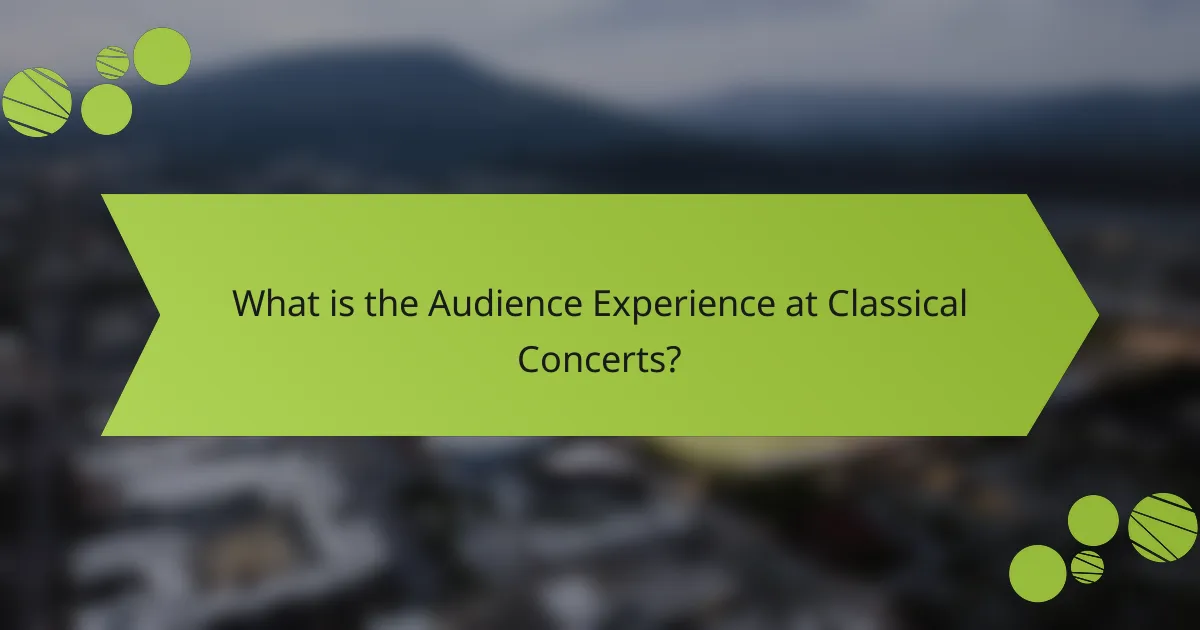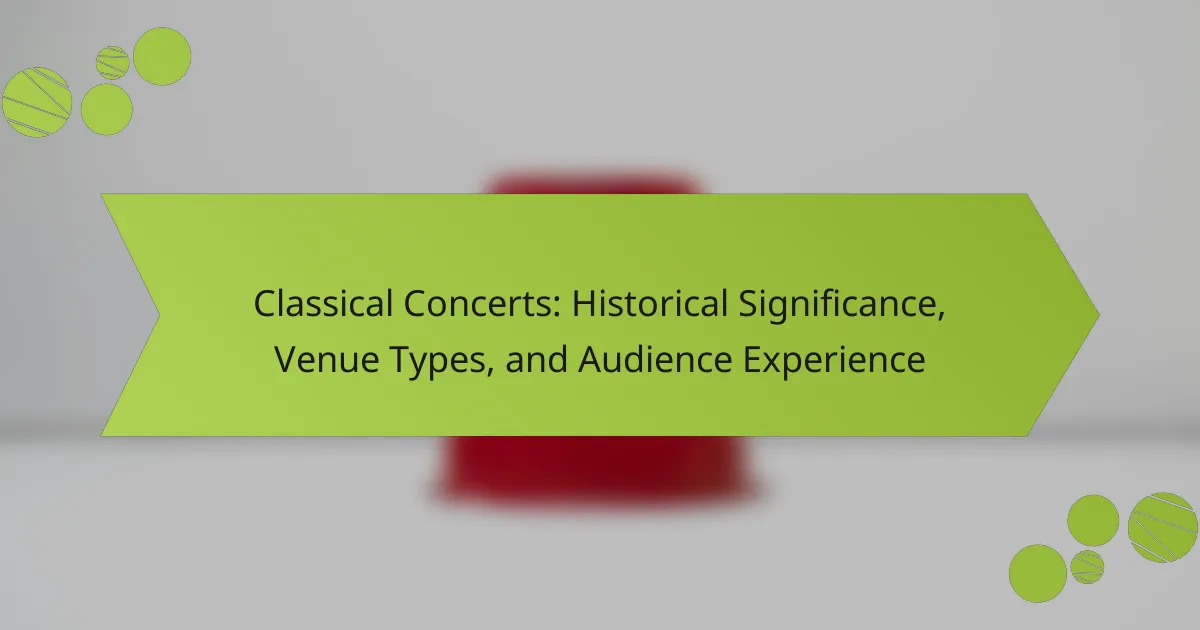Classical concerts are live performances that feature classical music, typically performed by orchestras or ensembles. These events showcase works by iconic composers such as Bach, Mozart, and Beethoven, serving as vital platforms for cultural expression and artistic collaboration. The article explores the historical significance of classical concerts, the various types of venues where they are held—ranging from concert halls to outdoor festivals—and the emotional and sensory experiences of the audience. By examining these elements, the article highlights the role of classical concerts in preserving musical heritage and fostering community engagement with the arts.

What are Classical Concerts and Their Importance?
Classical concerts are live performances featuring classical music, typically performed by orchestras or ensembles. They showcase compositions from renowned composers such as Bach, Mozart, and Beethoven. These concerts serve as a platform for cultural expression and artistic collaboration. They play a significant role in preserving musical heritage and educating audiences about classical music. Classical concerts foster community engagement and appreciation for the arts. They often take place in prestigious venues like concert halls, opera houses, and outdoor festivals. The experience of attending a classical concert can evoke deep emotional responses and connect audiences to the music’s historical context.
How have Classical Concerts evolved over time?
Classical concerts have evolved significantly from their origins in the 17th century. Initially, these concerts were often private events held in aristocratic homes. Over time, public concerts emerged, particularly in the 18th century, as composers like Haydn and Mozart began to gain popularity. The establishment of concert halls in the 19th century marked a pivotal shift, allowing larger audiences to enjoy performances.
The repertoire expanded during this period, incorporating works from various composers and styles. Technological advancements, such as the invention of the phonograph and radio, further transformed accessibility to classical music. In the 20th century, the rise of orchestras and ensembles diversified the concert experience. Today, classical concerts include a range of formats, from traditional symphonies to contemporary works, reflecting broader cultural influences.
This evolution illustrates the adaptability of classical music in response to societal changes and audience preferences.
What historical events influenced the development of Classical Concerts?
The development of Classical Concerts was influenced by several historical events. The rise of the patronage system in the 18th century allowed composers to create music for specific audiences. The establishment of public concert halls in the late 18th and early 19th centuries made classical music more accessible. The Industrial Revolution brought advancements in instrument manufacturing, enhancing sound quality. The emergence of orchestras as formal ensembles further shaped concert experiences. The Romantic period expanded the emotional range of compositions, attracting diverse audiences. Additionally, the proliferation of printed music facilitated broader distribution and performance opportunities. These events collectively transformed the landscape of classical music performance.
How did different musical eras shape the nature of Classical Concerts?
Different musical eras significantly shaped the nature of Classical Concerts. The Baroque era emphasized elaborate compositions and showcased virtuosity. Concerts featured orchestras with a focus on instrumental and vocal performances. The Classical era introduced structured forms like sonatas and symphonies. This led to clearer musical themes and audience engagement through formal concert settings. The Romantic era brought emotional expression and larger orchestras. Concerts became grander, with an emphasis on individual performers and dramatic narratives. The 20th century introduced diverse styles and experimentation. Concerts began to incorporate modern elements and broadened audience appeal. Each era’s characteristics influenced concert programming, performance styles, and audience expectations.
What cultural significance do Classical Concerts hold?
Classical concerts hold significant cultural importance as they serve as a bridge between historical traditions and contemporary society. They preserve and promote classical music, which has roots dating back centuries. The performances often feature works from renowned composers like Bach, Mozart, and Beethoven. These concerts foster community engagement, bringing diverse audiences together. They also support the arts, contributing to local economies through ticket sales and tourism. Educational programs associated with classical concerts enhance cultural literacy. Additionally, classical music is often linked to cultural identity and heritage, reflecting societal values and history. Overall, classical concerts play a vital role in sustaining and evolving cultural practices.
How do Classical Concerts reflect societal values and trends?
Classical concerts reflect societal values and trends through their repertoire, audience demographics, and performance practices. The selection of compositions often mirrors the cultural and political climate of the time. For example, works that address social justice or national identity become prominent during times of upheaval. Audience demographics also reveal societal trends, such as increasing diversity or changing age groups. For instance, recent studies show a rise in younger audiences attending classical concerts, indicating a shift in cultural engagement. Additionally, the venue types and accessibility of concerts reflect societal values around inclusivity and community engagement. Concerts held in public spaces promote accessibility and democratize the experience of classical music. Overall, these elements collectively demonstrate how classical concerts serve as a lens through which to view societal evolution.
In what ways do Classical Concerts contribute to cultural heritage?
Classical concerts contribute to cultural heritage by preserving and promoting historical music traditions. They showcase compositions from renowned composers like Bach, Mozart, and Beethoven. These concerts often take place in historic venues, enhancing the cultural experience. Audiences gain exposure to classical music’s evolution over centuries. Additionally, they foster community engagement through shared musical experiences. Educational programs associated with concerts help teach the history of classical music. This transmission of knowledge ensures that future generations appreciate the genre. Overall, classical concerts serve as a vital link between past and present cultural practices.

What are the Different Types of Venues for Classical Concerts?
Classical concerts can be held in various types of venues. Common venues include concert halls, which are specifically designed for acoustic performance. These halls often feature advanced sound technology and seating arrangements that enhance audience experience. Another type is opera houses, which cater to both orchestral and vocal performances. They typically have grand architecture and excellent acoustics. Outdoor venues, such as parks and amphitheaters, also host classical concerts, providing a unique atmosphere. Additionally, churches and cathedrals are popular for their natural acoustics and historical significance. Smaller venues, like community centers or intimate clubs, allow for a more personal experience. Each venue type contributes to the overall ambiance and enjoyment of classical music.
How do venue types affect the experience of Classical Concerts?
Venue types significantly influence the experience of classical concerts. Different venues, such as concert halls, outdoor amphitheaters, and churches, create unique acoustic environments. Concert halls are designed for optimal sound quality, enhancing the clarity of orchestral music. Outdoor venues may introduce unpredictable acoustics due to environmental factors like wind. Churches often provide a reverberant sound, which can enrich vocal performances. The seating arrangement in each venue type also affects audience engagement and interaction with the performance. For instance, intimate settings promote a closer connection between performers and the audience. Historical context further shapes audience expectations based on the venue’s reputation. Venues with a rich history, like the Vienna State Opera, elevate the concert experience through their cultural significance.
What are the characteristics of concert halls versus outdoor venues?
Concert halls are enclosed spaces designed for acoustics and audience comfort. They often feature controlled sound environments and seating arrangements that enhance the listening experience. Concert halls typically have fixed seating and advanced sound systems. They provide a stable climate and protection from weather conditions.
Outdoor venues are open-air spaces that allow for larger audiences. They often have flexible seating arrangements and can accommodate various event types. Sound quality can vary due to environmental factors like wind and distance. Outdoor venues are subject to weather conditions, which can affect the experience.
In summary, concert halls prioritize acoustics and comfort, while outdoor venues offer flexibility and capacity.
How does acoustics play a role in venue selection for Classical Concerts?
Acoustics is crucial in venue selection for classical concerts. The quality of sound significantly affects audience experience. Ideal acoustics enhance clarity and richness of musical performances. Concert halls are designed to optimize sound distribution and minimize echoes. Materials used in construction can absorb or reflect sound waves. Venues with high ceilings and curved surfaces improve sound projection. Studies show that acoustically optimized spaces lead to higher audience satisfaction. For instance, the Berlin Philharmonie is renowned for its exceptional acoustics, attracting top-tier performances.
What are some notable venues for Classical Concerts worldwide?
Some notable venues for classical concerts worldwide include Carnegie Hall in New York City. This iconic venue has hosted countless renowned orchestras and soloists since its opening in 1891. The Vienna State Opera in Austria is another prestigious location, famous for its exceptional acoustics and rich history. The Royal Albert Hall in London is well-known for its grand architecture and diverse programming. The Sydney Opera House in Australia is celebrated for its distinctive design and vibrant concert scene. Each of these venues has made significant contributions to the classical music landscape globally.
What makes specific venues iconic for Classical performances?
Specific venues become iconic for Classical performances due to their historical significance, architectural excellence, and acoustic properties. Venues like the Vienna State Opera and Carnegie Hall have hosted legendary performances. Their design often enhances sound quality, creating an immersive experience. Historical events, such as premieres of famous compositions, add to their prestige. Additionally, these venues attract world-renowned artists, further solidifying their status. The combination of these factors creates a unique cultural atmosphere. This legacy influences audience expectations and enhances the overall experience.
How do different regions influence the types of venues available?
Different regions significantly influence the types of venues available for classical concerts. Geographic location impacts architectural styles and cultural preferences. For example, European cities often feature historic opera houses and concert halls. These venues reflect centuries of classical music tradition. In contrast, North American venues may emphasize modern designs and multipurpose spaces. Cultural demographics also shape venue characteristics. Regions with strong classical music heritage prioritize acoustics and historical significance. Conversely, areas with diverse musical influences may create eclectic venue types. Local funding and support further determine venue availability. Regions with robust arts funding can sustain larger, more specialized venues. Thus, regional characteristics play a critical role in shaping the landscape of classical concert venues.

What is the Audience Experience at Classical Concerts?
The audience experience at classical concerts involves emotional engagement and sensory stimulation. Attendees often feel a sense of anticipation before the performance begins. The atmosphere is typically formal, enhancing the overall experience. Audiences listen attentively, creating a shared communal experience. The acoustics of the venue play a crucial role in sound quality. Many concertgoers express feelings of awe during performances. The interaction between musicians and the audience can also heighten emotional responses. Overall, the experience is designed to evoke deep appreciation for the music and artistry.
How do audiences engage with Classical music during concerts?
Audiences engage with Classical music during concerts through active listening and emotional response. They often display attentiveness by maintaining silence and focusing on the performance. Many audience members exhibit their appreciation through applause at the end of pieces. Some may respond emotionally, as studies show that music can evoke feelings of joy, sadness, or nostalgia. Additionally, audiences may engage by participating in pre-concert talks or educational sessions. These interactions help deepen their understanding of the music. Research indicates that audience engagement enhances the overall concert experience. Engaged audiences contribute to a vibrant atmosphere, enriching both their experience and that of the performers.
What behaviors and etiquette are expected from audiences at Classical Concerts?
Audiences at classical concerts are expected to exhibit respectful and attentive behavior. This includes arriving on time to avoid disrupting the performance. Silence is crucial during the performance to allow others to enjoy the music. Applause is typically reserved for the end of a piece or after a soloist’s performance. Attendees should refrain from talking or using electronic devices during the concert. Dress codes may vary, but formal or semi-formal attire is often encouraged. These behaviors ensure a positive experience for all attendees and honor the performers. Proper etiquette enhances the overall atmosphere of the concert.
How do audience demographics influence the atmosphere of Classical Concerts?
Audience demographics significantly influence the atmosphere of classical concerts. Factors such as age, cultural background, and socioeconomic status shape audience behavior and engagement. Younger audiences may exhibit more enthusiasm, while older attendees often display a more reserved demeanor. Diverse cultural backgrounds contribute to varied interpretations of the music, enhancing the overall experience. Socioeconomic status can affect attendance patterns, with wealthier individuals often supporting more exclusive events. Research indicates that a more diverse audience can lead to a richer and more dynamic atmosphere. Studies show that concerts with varied demographics often receive higher satisfaction ratings from attendees.
What are the emotional impacts of attending a Classical Concert?
Attending a classical concert can evoke a range of emotional impacts. Many individuals experience feelings of joy and elation during performances. The intricate melodies and harmonies often lead to heightened emotional responses. Research indicates that music can trigger the release of dopamine, a neurotransmitter associated with pleasure.
Furthermore, classical music has been shown to reduce stress levels. A study published in the Journal of Music Therapy found that participants reported lower anxiety after listening to classical compositions.
Additionally, the communal experience of attending a concert fosters a sense of connection among audience members. This shared emotional journey can enhance feelings of belonging and community. Overall, the emotional impacts of attending a classical concert can be profound and multifaceted.
How does live music affect listeners’ emotions compared to recorded music?
Live music typically evokes stronger emotional responses in listeners compared to recorded music. This is due to the unique atmosphere and energy present in live performances. The interaction between the audience and performers enhances emotional engagement. Studies show that live music can trigger the release of oxytocin, a hormone associated with bonding and emotional connection. In contrast, recorded music lacks this immediate social and sensory interaction. Research by the University of Southern California found that live performances significantly increase feelings of joy and excitement. Additionally, the spontaneity of live music can lead to unexpected emotional experiences. Overall, the immersive nature of live music creates a deeper emotional impact on listeners.
What role does the setting play in enhancing the audience’s experience?
The setting plays a crucial role in enhancing the audience’s experience during classical concerts. A well-chosen venue can influence acoustics significantly. For instance, concert halls with optimal sound design improve audio clarity. The architectural elements of a venue can also create an immersive atmosphere. Historical venues often evoke a sense of tradition and prestige. Comfortable seating and sightlines contribute to audience engagement. Additionally, the ambiance, including lighting and decor, affects emotional responses. Research indicates that audience satisfaction increases in aesthetically pleasing environments. Overall, the setting shapes the overall perception and enjoyment of the concert experience.
What tips can enhance the experience of attending a Classical Concert?
Arriving early can enhance the experience of attending a classical concert. This allows time to find your seat and absorb the atmosphere. Familiarizing yourself with the program beforehand improves understanding of the pieces performed. Dressing appropriately for the venue adds to the overall experience and respect for the performance. Engaging in active listening enhances appreciation of the music. Avoiding distractions, such as phones, maintains focus on the performance. Participating in post-concert discussions can deepen insights into the music. Finally, reflecting on the experience afterward solidifies the enjoyment and connection to the concert.
How should one prepare for a Classical Concert to maximize enjoyment?
To maximize enjoyment at a classical concert, one should familiarize themselves with the program beforehand. Understanding the composers and pieces being performed enhances appreciation. Listening to recordings of the works can provide context and familiarity. Arriving early allows time to find seating and absorb the atmosphere. Dressing appropriately for the venue can enhance the experience. Being mindful of concert etiquette, such as silencing phones, is crucial. Engaging with the music and performers during the concert deepens enjoyment. These steps contribute to a richer and more immersive experience at classical concerts.
What are common misconceptions about attending Classical Concerts?
Common misconceptions about attending classical concerts include the belief that they are only for elite audiences. Many people think classical music is inaccessible or overly formal. In reality, classical concerts welcome diverse audiences. Another misconception is that one must dress formally to attend. Most venues allow casual attire. Some believe that classical music is boring or difficult to understand. However, many compositions are engaging and emotionally resonant. Additionally, some think that attending a concert requires extensive knowledge of music theory. In truth, enjoyment can stem from simply appreciating the performance.
Classical concerts are live performances of classical music, typically featuring orchestras and renowned compositions from composers like Bach, Mozart, and Beethoven. This article explores the historical significance of classical concerts, their evolution over time, and the various types of venues where they are held, including concert halls, opera houses, and outdoor spaces. Additionally, it examines the audience experience, including engagement, emotional impacts, and etiquette expected at these events. The discussion highlights how classical concerts reflect societal values and contribute to cultural heritage, providing insights into the changing landscape of classical music performance and appreciation.
